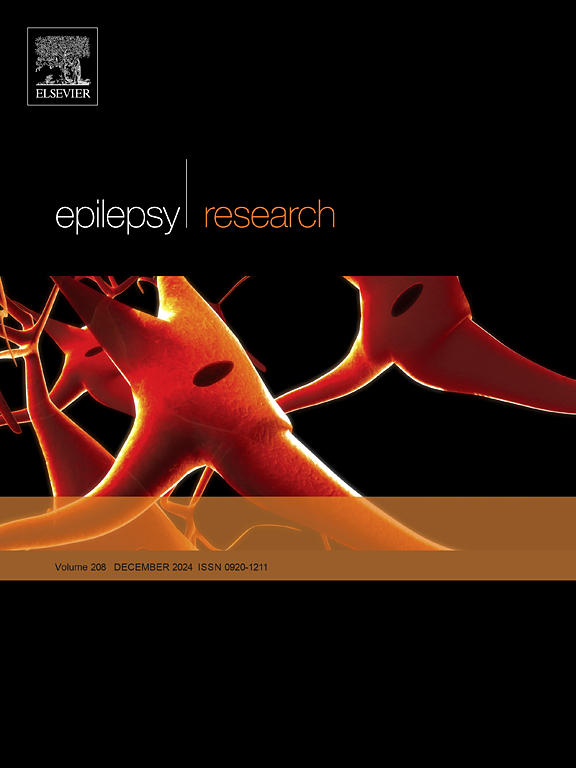Long-term efficacy and tolerability of brivaracetam in pediatric patients with focal-onset seizures and cognitive or learning comorbidities: Post hoc analysis of an open-label trial
IF 2
4区 医学
Q3 CLINICAL NEUROLOGY
引用次数: 0
Abstract
Objective
Efficacy, tolerability, and behavioral/executive functioning during long-term adjunctive brivaracetam treatment were assessed in pediatric patients with focal-onset seizures (FOS) with/without cognitive/learning comorbidities (CLC).
Methods
Post hoc analysis of a phase 3 open-label follow-up trial (N01266/NCT01364597). Patients with FOS (<16 years at core trial entry; direct enrollers ≥4–<17 years) received ≤5 mg/kg/day brivaracetam (≤200 mg/day). Subgroup analyses were performed for patients with and without ongoing CLC at baseline.
Results
Patients with CLC (84/185 [45.4 %]) had longer epilepsy duration and higher number of prior antiseizure medications. Kaplan-Meier–estimated brivaracetam retention at 1, 3, and 5 years was 75.0 %/78.2 %, 61.9 %/61.9 %, and 52.2 %/53.3 % in patients with/without CLC. Efficacy assessments (patients >2 years of age) showed numerically lower median percent reduction in FOS frequency/28 days (43.8 %/74.1 % [n = 63/60]), 50 % responder rates for FOS (46.0 %/61.7 % [n = 63/60]), and ≥12-month continuous freedom from all seizures (31.7 %/55.9 % [n = 60/68 patients with ≥12 months treatment]) in patients with/without CLC. Treatment-emergent adverse events were reported in 94.0 %/95.0 % of patients with/without CLC (serious: 33.3 %/27.7 %; drug-related: 31.0 %/33.7 %). From baseline to last evaluation, most patients with/without CLC had no shift in T-score category for each Achenbach Child Behavior Checklist (CBCL) 1.5–5 syndrome (≥50.0 %/≥72.2 %), CBCL 6–18 syndrome (≥66.0 %/≥69.1 %), and Behavior Rating Inventory of Executive Function scale (≥66.7 %/≥69.0 %).
Conclusions
These data indicate that brivaracetam could be an efficacious and well-tolerated treatment option for pediatric patients with FOS with and without CLC. Behavior and executive functioning were generally stable or slightly improved in patients with and without CLC.
布瓦西坦治疗局灶性癫痫和认知或学习合并症患儿的长期疗效和耐受性:一项开放标签试验的事后分析
目的:评估伴有/不伴有认知/学习合并症(CLC)的局灶性癫痫(FOS)患儿长期辅助布伐西坦治疗期间的疗效、耐受性和行为/执行功能。方法:对一项3期开放标签随访试验(N01266/NCT01364597)进行事后分析。结果:CLC患者(84/185[45.4 %])癫痫持续时间较长,既往抗癫痫药物使用次数较多。kaplan - meier估计,布伐西坦在1、3和5年的保留率分别为75.0 %/ 78.2% %、61.9 %/61.9 %和52.2 %/53.3 %。疗效评估(患者年龄为bb0 ~ 2岁)显示,在有/无CLC患者中,FOS频率/28天降低的中位数百分比较低(43.8 %/74.1 % [n = 63/60]), FOS的应答率为50 %(46.0 %/61.7 % [n = 63/60]),所有癫痫发作持续自由≥12个月(31.7 %/55.9 % [n = 60/68例治疗≥12个月的患者])。94.0 %/95.0 %的CLC /非CLC患者报告了治疗中出现的不良事件(严重:33.3% %/27.7 %;毒品:31.0 % / 33.7 %)。从基线到最后一次评估,大多数患有/未患有CLC的患者在每个Achenbach儿童行为检查表(CBCL) 1.5-5综合征(≥50.0 %/≥72.2 %),CBCL 6-18综合征(≥66.0 %/≥69.1 %)和执行功能量表行为评定量表(≥66.7 %/≥69.0 %)的t评分类别上没有变化。结论:这些数据表明布瓦西坦可能是一种有效且耐受性良好的治疗方案,适用于伴有或不伴有CLC的小儿FOS患者。无论有无CLC,患者的行为和执行功能总体稳定或略有改善。
本文章由计算机程序翻译,如有差异,请以英文原文为准。
求助全文
约1分钟内获得全文
求助全文
来源期刊

Epilepsy Research
医学-临床神经学
CiteScore
0.10
自引率
4.50%
发文量
143
审稿时长
62 days
期刊介绍:
Epilepsy Research provides for publication of high quality articles in both basic and clinical epilepsy research, with a special emphasis on translational research that ultimately relates to epilepsy as a human condition. The journal is intended to provide a forum for reporting the best and most rigorous epilepsy research from all disciplines ranging from biophysics and molecular biology to epidemiological and psychosocial research. As such the journal will publish original papers relevant to epilepsy from any scientific discipline and also studies of a multidisciplinary nature. Clinical and experimental research papers adopting fresh conceptual approaches to the study of epilepsy and its treatment are encouraged. The overriding criteria for publication are novelty, significant clinical or experimental relevance, and interest to a multidisciplinary audience in the broad arena of epilepsy. Review articles focused on any topic of epilepsy research will also be considered, but only if they present an exceptionally clear synthesis of current knowledge and future directions of a research area, based on a critical assessment of the available data or on hypotheses that are likely to stimulate more critical thinking and further advances in an area of epilepsy research.
 求助内容:
求助内容: 应助结果提醒方式:
应助结果提醒方式:


